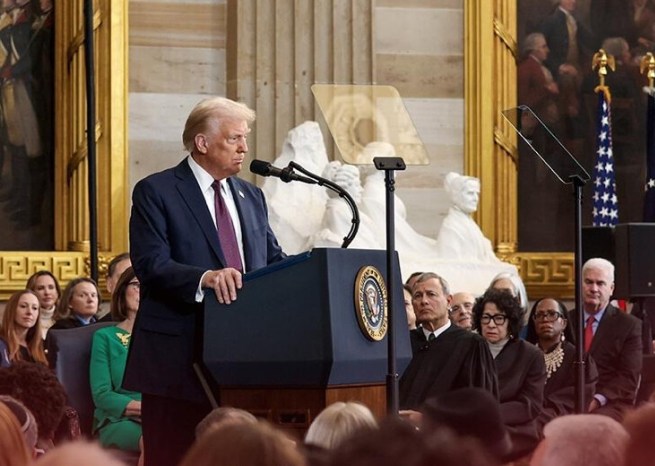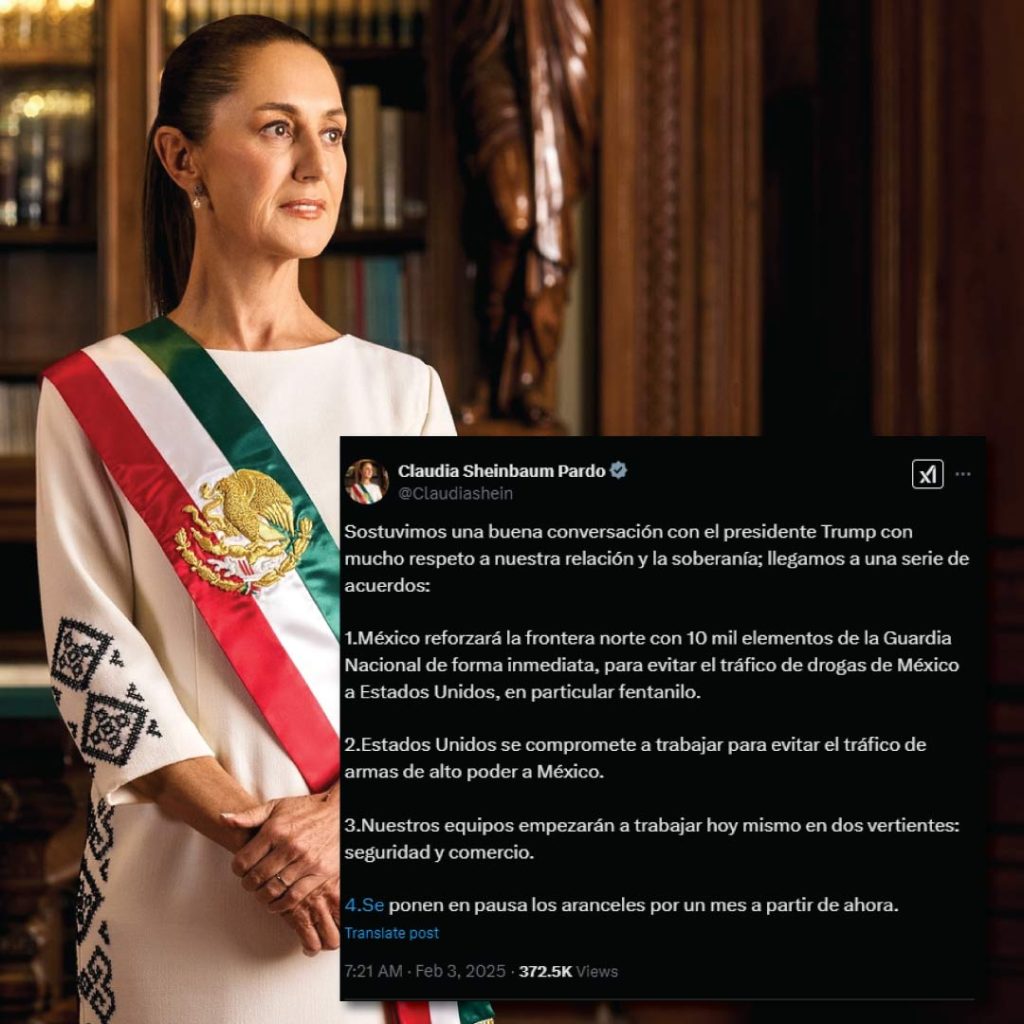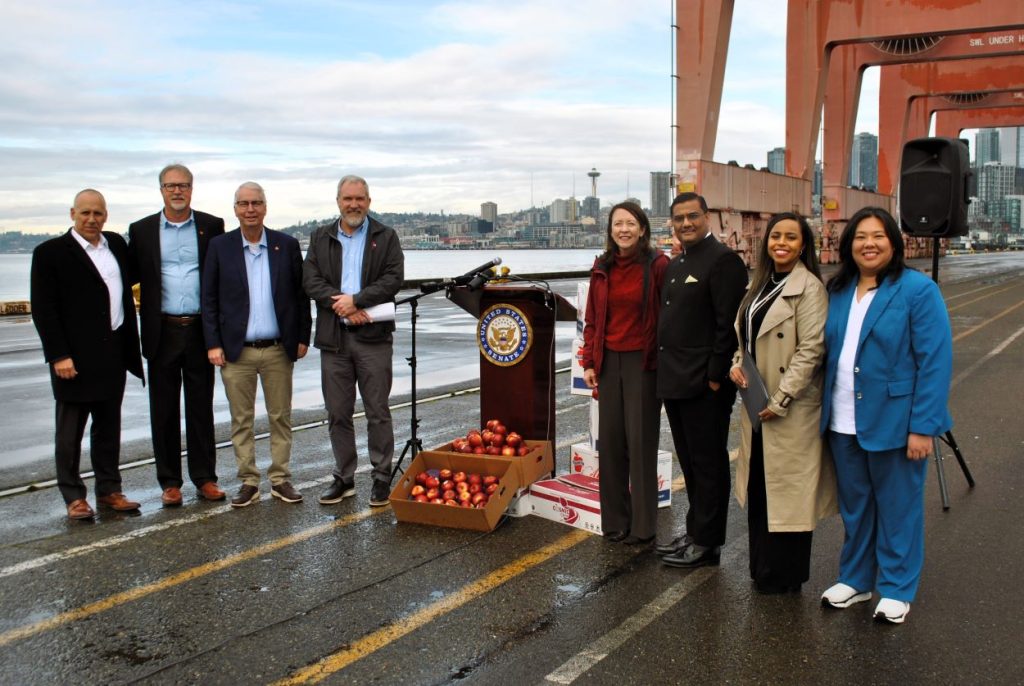WASHINGTON D.C.—On January 31 President J Trump announced plans to impose 25% tariffs on many goods imported into the United States from Canada and Mexico as well as a 10% tariff on goods imported from China.

The move is aimed at tackling undocumented immigrants and the nation’s opioid epidemic, the Trump administration says, though it could mean a spike in energy, agricultural products, and manufactured goods for Washingtonians – seeing as traded goods accounted for over $127 billion worth of imports and exports in 2023, with Canada and Mexico forming the bulk of this.
In Washington State two out of every five jobs are tied to trade and related industries. Its estimated that Trump’s tariffs would add approximately $144 billion a year to the cost of manufacturing in the United States.
A day after Trump announced his plan to impose tariffs on Canada, Canadian Prime Minister Justin Trudeau announced a plan of his own to impose retaliatory tariffs of 25% on approximately $170 billion of U.S. goods.

Mexican President Claudia Sheinbaum initially stated that she would be implementing a “Plan B” retaliatory tariffs as well, but after a meeting with President Trump on Monday, February 3, the two agreed to place a one-month pause on the anticipated tariffs in exchange for 10,000 Mexican soldiers assigned to the border to prevent the flow of fentanyl and “illegal migrants,” while the U.S. agreed to crack down on the trafficking of high-powered weapons to Mexico.
Just hours after this meeting, President Trump met with Prime Minister Trudeau remotely where they struck a similar deal: a 30-day pause on tariffs in exchange for heightened border security.
Following and during the pause, President Trump, Secretary of State Marco Rubio, Secretary of Treasury Scott Bessent, and Secretary of Commerce Howard Lutnick will be meeting with Mexican and Canadian officials to negotiate how to move forward from here.
If these negotiations prove fruitless President Trump’s imposed tariffs could pose expensive consequences for Washington State consumers, as highlighted in a recent report sent out by Senator Maria Cantwell’s Office last Friday.

“President Trump should not start trade wars that hurt American manufacturers, consumers, and farmers, especially when food prices and interest rates are so high. After two weeks in office and lots of executive orders, where are the administration’s ideas to lower costs for American families? Let’s not put 25% tariffs that will increase consumer costs,” wrote Sen. Cantwell. “Canada and Mexico are already willing to partner with us to fight fentanyl and strengthen border security. I hope the President will work with Congress on opening new markets, growing U.S. exports, and using the EXIM Bank to compete with China, instead of driving up prices at the grocery store and gas pump. I want an export strategy — one that maximizes opportunities to sell American products overseas.”
Below are the findings that that report:
Impacts on Washington State Agriculture
According to Senator Maria Cantwell’s Office, Washington-grown and processed agricultural exports totaled $7.5 billion in 2023. In addition to this Washington ports are responsible for moving approximately $11 billion worth of agricultural goods produced in other states.
Canada is Washington’s number one export market, valued at $1.3 billion 2023, and Mexico is the state’s fourth largest agricultural export market valued at $687 million. China is Washington’s third largest export market of agricultural goods valued at $857 million.
According to the Washington Wine Commission, Canada bought $18 million worth of Washington State wine in 2023 making the country the industry’s largest export market. Meanwhile, that same year, the United States imported approximately $2 billion in agricultural goods from Canada. Most of these goods included tallow, canola oil, baked goods, and prepared or preserved meats.
The pause on imposing tariffs on Mexican imports and exports averted a likely spike in fresh fruits, dairy, processed fruits, wheat, corn, and oilseeds which encompass the largest categories in agricultural products.
President Trump’s administration imposed similar tariffs on steel and aluminum back in 2018 which sparked a 20% retaliatory tariff from Mexico on a range of agricultural goods. During these tariffs Washington state apple exports fell by more than 29% while potato exports to Mexico dropped by 21%. The passage of the United States-Mexico-Canada Agreement (USMCA) in 2020 put in end to these tariffs.
Impacts on Washington State Energy
Imported energy from Canada accounts for the largest value of imported goods representing 60% of all Canadian imports by value. According to the U.S. Census Bureau, Washington State imported more than $8 billion worth of oil and gas from Canada last year which means a 25% tariff could result in more than $2 billion in costs for consumers from electricity to heating.
In 2023 more than 3 million American households rely upon natural gas for heating, hot water, and kitchen appliances, according to the U.S. Energy Information Administration, as well as over 112,000 businesses, institutions, and industries.
The United States imports more than 1.6 billion barrels of crude oil and petroleum products from Canada annually with most of this being used in the Pacific Northwest, northern plain states, and the Midwest. Because of this, tariffs on crude oil could also impact gasoline, diesel, and jet fuel prices which, in turn, would affect the costs of goods as they adjust for the higher costs related to transport.
According to a industry experts a 25% tariff on Canadian natural gas could result in at least $1.1 billion increase in cost to U.S. natural gas consumers.
Impacts on Washington State Manufacturing
In addition to, and somewhat related to the aforementioned energy cost spikes, imposed tariffs on Canada and Mexico could result in increased manufacturing costs across the state from automotive; to home appliance and electronics; to building and construction. As it stands, of the $8.5 billion wort of sawmill and wood products imported into the U.S. in 2023, 70% of them came from Canada.
The United States also imports substantial uranium, nickel, and aluminum from Canada which are pivotal for nuclear energy, defense, and the manufacturing sector. Canada provides 50% of the U.S.’s nickel needs alone.
These mineral imports often pass back and forth from Canada and the U.S. before they are used for various stages of production and processing which could add an additional $11.7 billion to U.S. buyers.
In addition, one in five automobiles purchased in the United States were built in Canada or Mexico and in 2023 the U.S. imported $69 billion in these vehicles from Mexico and $37 billion from Canada. That same year $78 billion in auto parts came from Mexico and $20 billion came from Canada. Similar to the automobiles, nearly a third of all U.S. home appliances were imported in 2023 valued at $9.8 billion.
The Federal Reserve Board found that President Trump’s 2018 tariffs on China caused a 1.4% in reduction to manufacturing employment in the United States meaning that similar tariffs this year could further impact the manufacturing sector workforce.
Author: Kienan Briscoe












